Cocos Native Plugin Quick Tutorial
If you want to use third-party native libraries in a native project, you can follow the steps in this article.
This article requires some understanding of native project compilation and generation, which developers can learn about through CMake official website. We have also prepared a sample project GitHub for reference.
Create a native plugin
Basic Setup
Create a cocos project with Cocos Creator 3.6+
Start the CocosCreator application, and run
Create an empty projectin the chosen folder.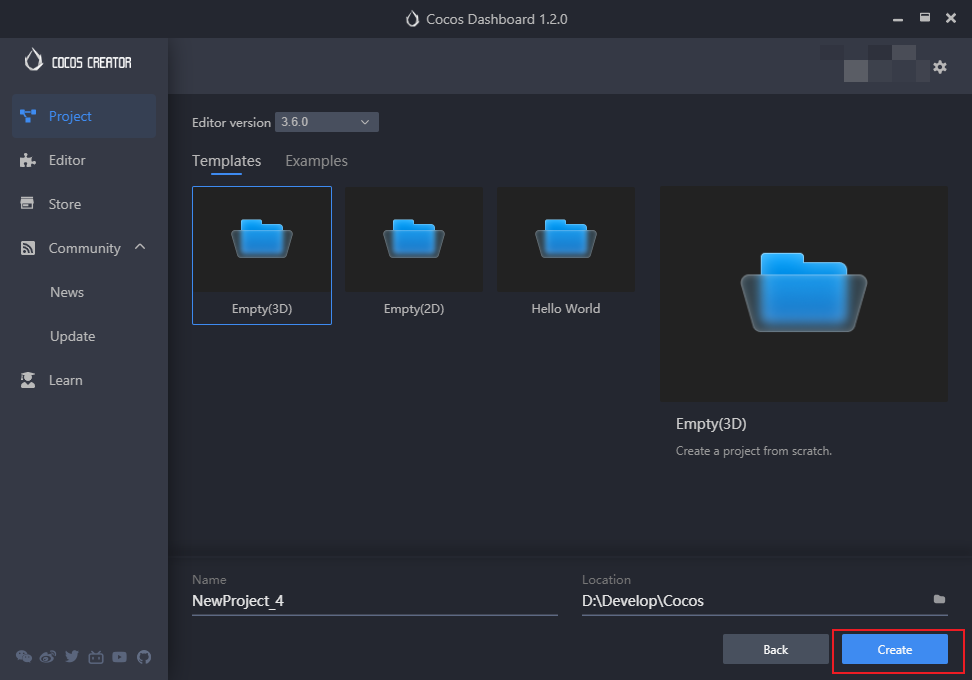
Create and save an empty scene
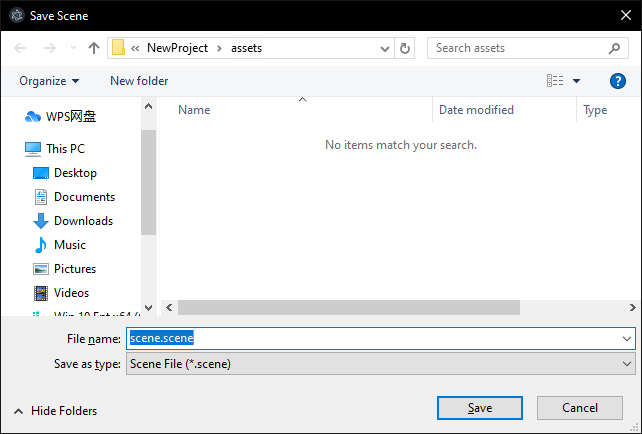
A native build is needed to be created first to generate the
native/directory.Create a build task for any native platform, for example Windows
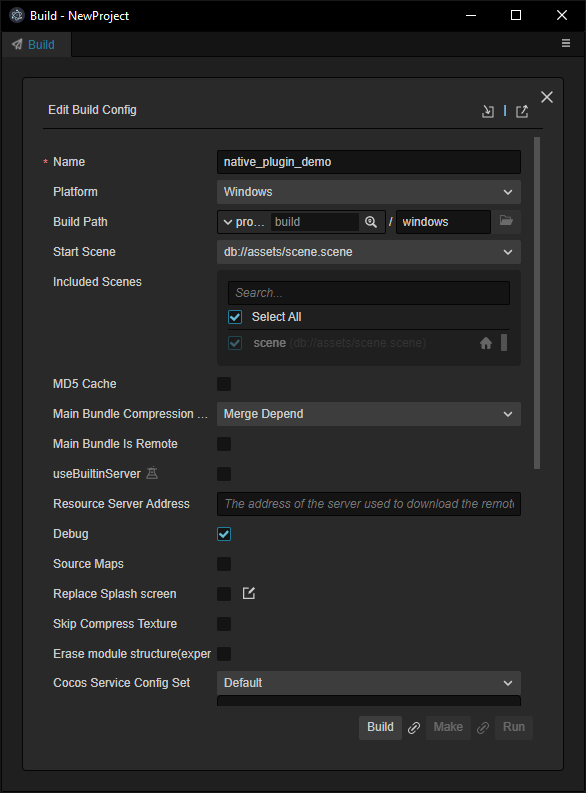
Run Build,
native/folder should be created after that.console$ tree native/ -L 2 native/ └── engine ├── common └── win64Create a folder for the plugin
consolemkdir -p native/plugins/hello_cocos
Add support for Windows
Prepare the folder for Windows
consolemkdir -p native/plugins/hello_cocos/windows/Copy precompiled
hello_cocoslibrary and header files into the plugin directoryconsole$ tree native/plugins/ native/plugins/ └── hello_cocos ├── include │ └── hello_cocos.h └── windows └── lib ├── hello_cocos.lib └── hello_cocosd.libAdd files
hello_cocos_glue.cpp,CMakeLists.txtandhello_cocos_glue-config.cmakeconsolemkdir native/plugins/hello_cocos/src touch native/plugins/hello_cocos/src/hello_cocos_glue.cpp touch native/plugins/hello_cocos/src/CMakeLists.txt touch native/plugins/hello_cocos/windows/hello_cocos_glue-config.cmakeNow the plugin directory should look like this:
console$ tree native/plugins/hello_cocos/ native/plugins/hello_cocos/ ├── include │ └── hello_cocos.h ├── src │ ├── CMakeLists.txt │ └── hello_cocos_glue.cpp └── windows ├── hello_cocos_glue-config.cmake └── lib ├── hello_cocos.lib └── hello_cocosd.libEdit
hello_cocos_glue-config.cmakewith following contentcmakeset(_hello_cocos_GLUE_DIR ${CMAKE_CURRENT_LIST_DIR}) add_library(hello_cocos STATIC IMPORTED GLOBAL) set_target_properties(hello_cocos PROPERTIES IMPORTED_LOCATION ${_hello_cocos_GLUE_DIR}/lib/hello_cocos.lib IMPORTED_LOCATION_DEBUG ${_hello_cocos_GLUE_DIR}/lib/hello_cocosd.lib ) include(${_hello_cocos_GLUE_DIR}/../src/CMakeLists.txt)Declare an existing library
hello_cocosadd import it.Edit
native/plugins/hello_cocos/src/CMakeLists.txtwith following contentcmakeset(_hello_cocos_GLUE_SRC_DIR ${CMAKE_CURRENT_LIST_DIR}) add_library(hello_cocos_glue ${_hello_cocos_GLUE_SRC_DIR}/hello_cocos_glue.cpp) target_link_libraries(hello_cocos_glue hello_cocos ${ENGINE_NAME} # cocos_engine ) target_include_directories(hello_cocos_glue PRIVATE ${_hello_cocos_GLUE_SRC_DIR}/../include )Create
cc_plugin.jsoninnative/plugins/hello_cocos/json{ "name":"hello-cocos-demo", "version":"0.1.0", "author":"cocosdemo", "engine-version":">=3.6.0", "modules":[ { "target":"hello_cocos_glue" } ], "platforms":["windows"] }
Now the plugin is created and enabled in this project. But it won't compile, since there is no code in hello_cocos_glue.cpp
Let's Build again in the build panel to refresh the Visual Studio project.
- Open the Visual Studio project under
build/windows/proj/
Two additional targets are generated
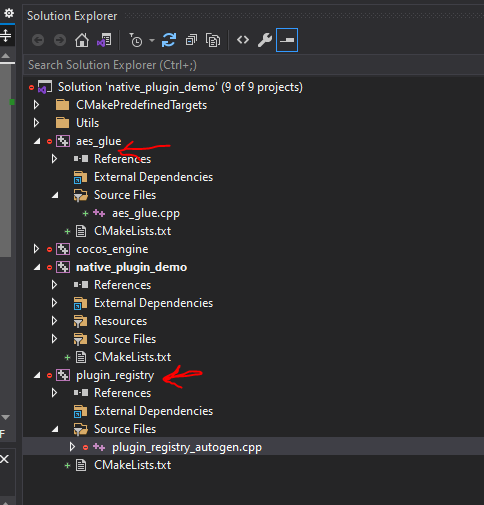
If you run the target directly, you will fail with the following link error:

Edit
hello_cocos_glue.cppc++#include "hello_cocos.h" #include "bindings/sebind/sebind.h" #include "plugins/bus/EventBus.h" #include "plugins/Plugins.h" // export c++ methods to JS static bool register_demo(se::Object *ns) { sebind::class_<Demo> klass("Demo"); klass.constructor<const char *>() .function("hello", &Demo::hello); klass.install(ns); return true; } void add_demo_class() { using namespace cc::plugin; static Listener listener(BusType::SCRIPT_ENGINE); listener.receive([](ScriptEngineEvent event) { if (event == ScriptEngineEvent::POST_INIT) { se::ScriptEngine::getInstance()->addRegisterCallback(register_demo); } }); } /** * Regist a new cc plugin entry function * first param: should match the name in cc_plugin.json * second param: callback when engine initialized */ CC_PLUGIN_ENTRY(hello_cocos_glue, add_demo_class);
Start the project in debug mode, a new window should launch.
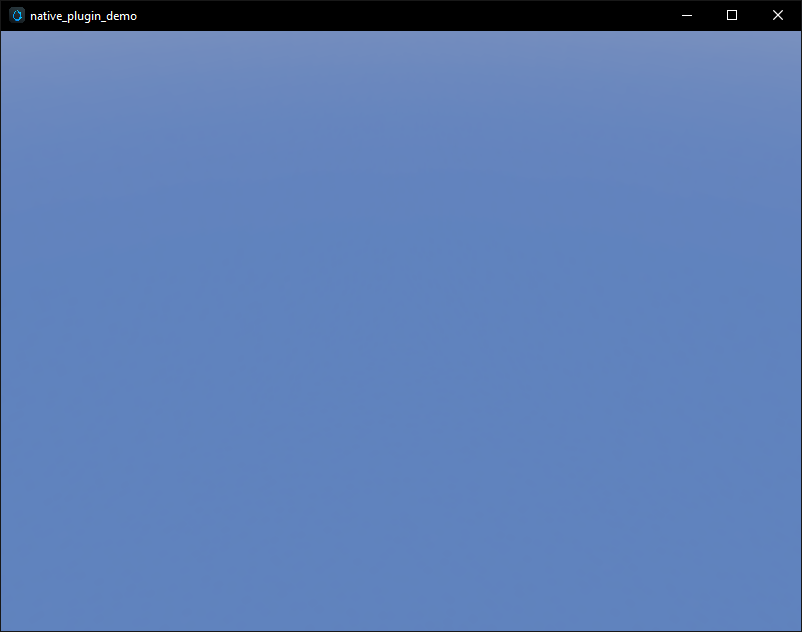
Until now, we are not sure if the plugin is enabled or not.
In the output window, we can the debug URL of the devtools

Open the URL with chrome and type following code in Console
new Demo("World").hello("Cocos")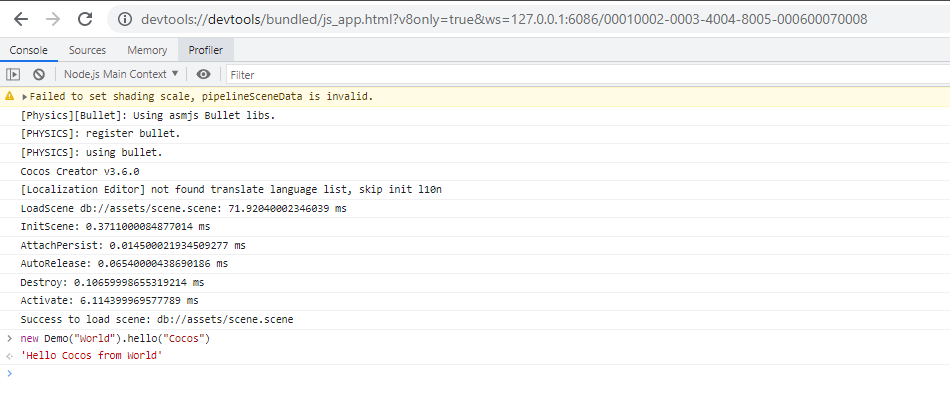
The class hello_cocos and its methods are exported successfully!
Add support for Android
Add a build task for Android
Create a folder for android
consolemkdir native/plugins/hello_cocos/androidCopy precompiled libraries and headers and create
hello_cocos_glue-config.cmakeThe folder should look like this:
console$ tree native/plugins/hello_cocos/android/ native/plugins/hello_cocos/android/ ├── hello_cocos_glue-config.cmake ├── arm64-v8a │ └── lib │ └── libhello_cocos.a └── armeabi-v7a └── lib └── libhello_cocos.aEdit
hello_cocos_glue-config.cmakecmakeset(_hello_cocos_GLUE_DIR ${CMAKE_CURRENT_LIST_DIR}) add_library(hello_cocos STATIC IMPORTED GLOBAL) set_target_properties(hello_cocos PROPERTIES IMPORTED_LOCATION ${_hello_cocos_GLUE_DIR}/${ANDROID_ABI}/lib/libhello_cocos.a ) include(${_hello_cocos_GLUE_DIR}/../src/CMakeLists.txt)Update
cc_plugin.jsonAdd
androidtoplatformsfieldjson{ "name":"hello-cocos-demo", "version":"0.1.0", "author":"cocosdemo", "engine-version":">=3.6.0", "modules":[ { "target":"hello_cocos_glue" } ], "platforms":["windows", "android"] }Create an android build task
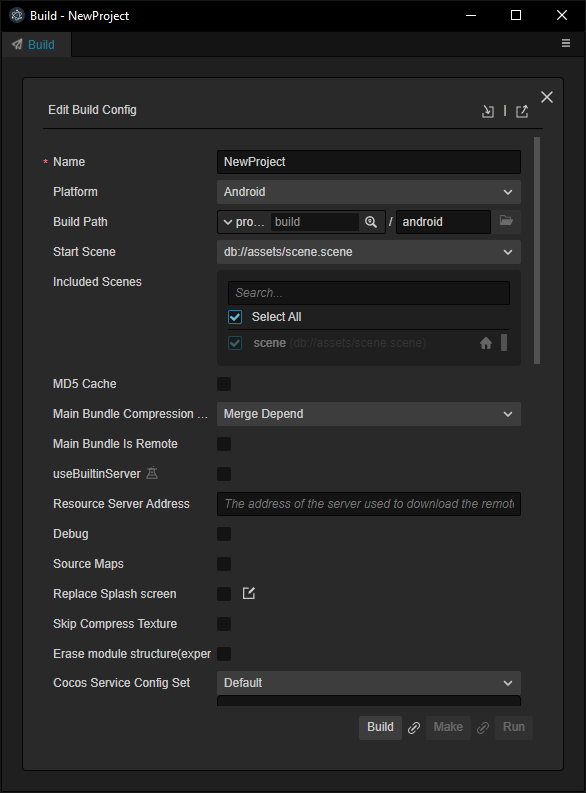
Run Build and debug with Android Studio.
Add support for iOS
Add a build task for iOS
Prepare a folder for iOS
mkdir -p native/plugins/hello_cocos/ios/libCopy precompiled libraries and edit
native/plugins/hello_cocos/ios/hello_cocos_glue-config.cmakecmakeset(_hello_cocos_GLUE_DIR ${CMAKE_CURRENT_LIST_DIR}) add_library(hello_cocos STATIC IMPORTED GLOBAL) set_target_properties(hello_cocos PROPERTIES IMPORTED_LOCATION ${_hello_cocos_GLUE_DIR}/lib/libhello_cocos.a ) include(${_hello_cocos_GLUE_DIR}/../src/CMakeLists.txt)
Add support for Mac
Add a build task for MacOS
Prepare a folder for MacOS
consolemkdir -p native/plugins/hello_cocos/mac/libCopy precompiled libraries and edit
native/plugins/hello_cocos/ios/hello_cocos_glue-config.cmakecmakeset(_hello_cocos_GLUE_DIR ${CMAKE_CURRENT_LIST_DIR}) add_library(hello_cocos STATIC IMPORTED GLOBAL) set_target_properties(hello_cocos PROPERTIES IMPORTED_LOCATION ${_hello_cocos_GLUE_DIR}/lib/libhello_cocos.a ) include(${_hello_cocos_GLUE_DIR}/../src/CMakeLists.txt)Update
cc_plugin.jsonagain**, AddiOS&mactoplatformsfieldjson{ "name":"hello-cocos-demo", "version":"0.1.0", "author":"cocosdemo", "engine-version":">=3.6.0", "modules":[ { "target":"hello_cocos_glue" } ], "platforms":["windows", "android", "iOS", "mac"] }
Now a plugin supporting Android, Windows, MacOS & iOS is done.
The final content of the plugins is:
$ tree native/plugins/hello_cocos/
native/plugins/hello_cocos
├── cc_plugin.json
├── include
│ └── hello_cocos.h
├── src
│ ├── CMakeLists.txt
│ └── hello_cocos_glue.cpp
├── android
│ ├── hello_cocos_glue-config.cmake
│ ├── arm64-v8a
│ │ └── lib
│ │ └── libhello_cocos.a
│ └── armeabi-v7a
│ └── lib
│ └── libhello_cocos.a
├── ios
│ ├── hello_cocos_glue-config.cmake
│ └── lib
│ └── libhello_cocos.a
├── mac
│ ├── hello_cocos_glue-config.cmake
│ └── lib
│ └── libhello_cocos.a
└── windows
├── hello_cocos_glue-config.cmake
└── lib
├── hello_cocos.lib
└── hello_cocosd.libIt's ready to ship.
Distribute with Editor Extension
Follow the steps in Editor Extension to create an Editor Extension, you need to copy the directory native/plugins/hello_cocos into the extension package when Packaging the Extension, then submit.
About upgrade: The editor extension system does not support update detection at the moment. Plugin users need to check in Cocos Store or Dashboard and manually upgrade to the latest version. Of course, developers can still implement their version management based on the existing extension system.
